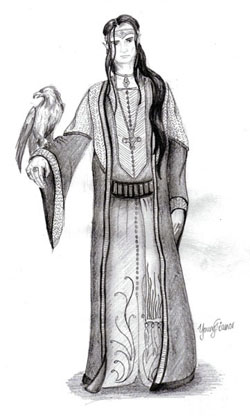
"Young Fëanor" by Silidir.

The tales of The Silmarillion contain within them the history of the body of legend of J.R.R. Tolkien. The epic, tragic, and grand-in-scale backstory of The Silmarillion, the multiple invented languages, the voluminous notes of a lifetime of effort comprise the huge underground caverns, tunnels and molten subterranean rivers of a gigantic volcano of which the trilogy Lord of the Rings is but a visible above-ground peak. Some might say that there is no central character in The Silmarillion, but one could argue that Fëanor, the eldest son of Finwë, the first King of the Noldor, is the star of the backstory. One of world literature’s great heroes/anti-heroes, Fëanor is Tolkien’s supreme character.
Fëanor: (his voice confident and smooth) Good evening, audience. I am Curufinwë Fëanáro, made a Spirit of Fire by Ilúvatar himself, creator of numerous GENIUS inventions, and the head of the House of Fëanor. I will be your narrator this evening, seeing as how your original narrator fell to (pauses and smirks in reminiscence) unfortunate circumstances, shall we say?
Random Audience Member 1: Kinslayer!
Random Audience Member 2: Traitor!
Fëanor: (raises hands as though in surrender) Now, now, let’s not call each other names. You don’t hear me calling me calling you all “Round Ears” or “Fertilizer” do you? And well I could, seeing as how they are both true. But I ask instead, is an Elda amiss to wish to redress the wrongs done him in literature by telling the true tales of his family?
Random Audience Fangirl: (shrieking) Fëanor! A want to have your baby!
Fëanor: That’s more like it.
~~~
Excerpt from The Fëanorian Chronicles, as told by
Master of Lore Dawn Felagund Master of Everything Curufinwë Fëanáro (a play by Dawn Felagund)
Fëanor is a Sindarinized version of his mother-name Fëanáro (Spirit of Fire). (The correct Sindarin form, never used, would be Faenor.) Fëanor’s father-name was Curufinwë (Skillful Finwë). Born in Tirion on Túna in Aman, the eldest and the most loved of the sons of Finwë, Fëanor would come to be called the greatest of all the Noldor and the best remembered and most notorious of any of the Firstborn in all the tales of the Elder Days. When Fëanor was born to King Finwë and his first wife Míriel Þerindë, she said, “Never again shall I bear child; for strength that would have nourished the life of many has gone forth into Fëanor.” Míriel was never to recover from the birth of Fëanor but was to languish until her spirit left her body and passed into the Halls of Mandos. Fëanor’s loss of his mother and Finwë’s decision to abandon his first wife and take a second were to have a lasting and dramatic effect upon the fate of the Noldor.
Feanáro…
It came upon a whisper, a siren's song, and woke him from a dreamless sleep. As he lay quiet, the soft caress of his nebulous mistress incited in him fire and he left his wife's side to follow into the star-filled night.
Create us...
Coming to him unambiguously, the mysteries of such creations, he began to form his vision through the rhythm of her song. Soon two others, subtly different; yet just as beautiful and haunting, joined her voice. Forsaking all else, he remained until he had given form to his beloved masterpieces.
Fill us...set fire in our depths...
Fëanor's hands ensnared the radiance of silver-hued Telperion and golden-blaze Laurelin in heavenly form; Varda blessed, incorruptible fire.
Love us...protect us from all others...
Turning from friend and family, abandoning reason, thoughts focused solely on safeguarding the Silmarils. But he was betrayed and his ultimate enemy ripped them away into blackness. Loss of his father kindling fury in his blood, he vowed to retrieve his treasures by life or death and his sons, all bound to the same cursed oath.
Kill for us...
Slaying his kin, forever sealing his doom as foretold, he took his final steps into utter madness. Blinded by all else, Fëanor's heart heard the lament of his creation but the cries of the innocents he slaughtered fell on deaf ears.
Fight for us...do not forsake us...
Assailed by armies of Morgoth, he faced his doom. Mortally wounded by a servant of his enemy, his sons mournfully bore his hroa away. Fever of his vengeance scorched his fea and again he made his sons swear to save his precious paramours before the flames consumed him completely.
Die for us...
Whispered song carried on the breeze corrupting his heirs with obsession to possess jewels of everlasting light.
~~~
"Seduction … Creation … Love … Loss ~ Fëanor's Fate" by Alassante
Tolkien spared no adjectives or superlatives when he wrote of Fëanor. His description of Fëanor in his youth is that "[He] grew swiftly, as if a secret fire were kindled within him. He was tall, and fair of face, and masterful, his eyes piercingly bright and his hair raven-dark; in the pursuit of all his purposes eager and steadfast. Few ever changed his courses by counsel, none by force. He became of all the Noldor, then or after, the most subtle in mind and the most skilled in hand" (1). High praise, indeed, when Tolkien had pronounced the Noldor of all the Elven kindred the most gifted and especially devoted to knowledge.
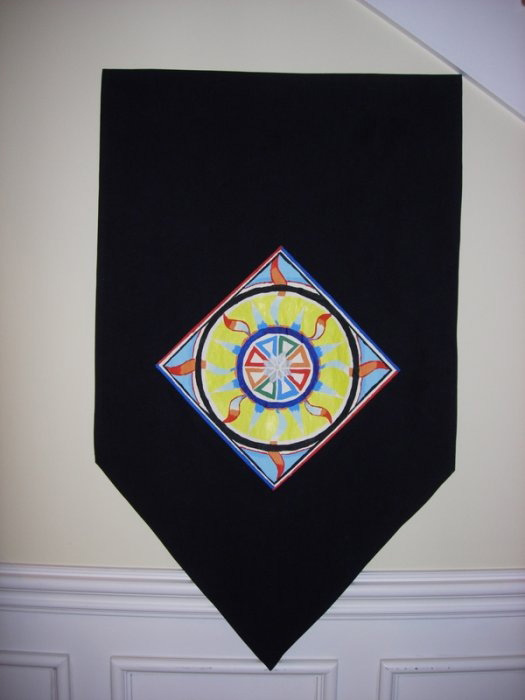
"Banner of the House of Fëanáro" by Kelsey Bartiss. Acrylics on fabric, sewed with a sewing machine. (View detail.)
Precocious in craft and achievement Fëanor is credited already in his youth with the creation of his Tengwar alphabet, an improvement based upon the earlier Sarati script invented by Rúmil of Valinor. Fëanor’s system was first used by the Noldor for writing Quenya in Aman and later used for Sindarin and other languages throughout Middle-earth. He was still in his early youth when he married Nerdanel, daughter one of the great smiths of the Noldor named Mahtan, who was himself close to Aulë and contributed to Fëanor’s training in the use of metal and stone. His wife was recognized in her own right as a craftsman and artist and known as “Nerdanel the Wise.” Not only did she bear Fëanor an unprecedented seven sons but is said to have been strong enough of will and intellect to have restrained his rashest impulses until the point of their eventual estrangement.
The beginning of Fëanor’s unrest dates back to his dissatisfaction with his father’s rejection of his union with Míriel and his taking of Indis of the Vanyar as his wife. Despite the fact that Finwë always acknowledged Fëanor as his best-loved son and heir, his eldest son was unable to accept his half-brothers with unanimity. That discomfort and his anxiety about their relationship to his father were to profoundly affect political affairs within the ranks of the Noldor.
They were all before him, three rough jewels yet unfashioned, but of a quality that out-matched any others. All were clear and unmarred, sparkling with brilliance in the fire light of his forge. He touched each one with light, reverent, fingers, daring to think that these jewels, once fashioned beautifully, could shine even brighter with the light of the Trees. He would be the creator of the jewels, and even the Valar would marvel at their glory. The thought took hold, becoming more than a distinct possibility. Grabbing familiar tools, Fëanor took the first gem aside and began to work.
~~~
Excerpt from Of the Silmarils by Isil Elensar
After years of enhancing his reputation among the Noldor by his unmatched accomplishments, Fëanor was acknowledged to be not only the chief craftsman and scientist of his people, but their principle linguistic loremaster as well (2). It is said that among his endeavors in art and craft was the invention of the Palantíri, the great seeing stones, some of which were gifted to the men of Numenor and feature so principally in The Lord of the Rings. (Both Tolkien and writers of fanfiction delight in crediting Fëanor with a whole series of Elven scientific and technological inventions—like the blue-shining lamps of the Noldorin Elves, called Fëanorian lamps (3). An essay on that subject alone could be interesting.) Fëanor reached the pinnacle of his creative genius when he crafted the three great Jewels, the Silmarils, made of crystalline matter which he called silima. The best description of this substance is the one given by Tolkien himself:
Like the crystal of diamonds it appeared, and yet was more strong than adamant, so that no violence could mar it or break it within the Kingdom of Arda. Yet that crystal was to the Silmarils but as is the body to the Children of Ilúvatar: the house of its inner fire, that is within it and yet in all parts of it, and is its life. And the inner fire of the Silmarils Fëanor made of the blended light of the Trees of Valinor, which lives in them yet, though the Trees have long withered and shine no more. Therefore even in the darkness of the deepest treasury the Silmarils of their own radiance shone like the stars of Varda; and yet, as were they indeed living things, they rejoiced in light and received it and gave it back in hues more marvellous than before (4).
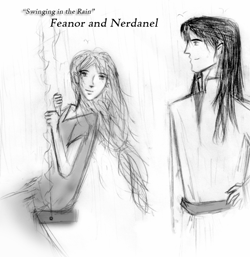
"Swinging in the Rain" by Noliel.
Here Tolkien’s tale takes the path of many similar stories of myth and legend. The creation of such incomparable objects resulted in both in the criminal envy of a villain and dangerous arrogance on the part of their creator. Melkor, the Vala-turned-bad and the arch villain of Tolkien’s entire canon, who had been given a second chance by his fellow demigods, envied Fëanor his talent and his wondrous jewels and was able to sow discord among the Noldor based partially upon Fëanor’s increasingly protective obsession with Silmarils and his jealousy of his half-brother Fingolfin’s influence with their father. Fëanor, who was more concerned with craft than politics, feared that Fingolfin would attempt to supplant him as Finwë’s heir and Melkor knew exactly how to nurture such seeds of conflict.
In the face of lies, rumors and mistrust fostered by Melkor which spread among the Noldor, Fëanor threatened his brother at sword point. Rather than leaving the governance of the Noldor and the resolution of the strife within his own house to King Finwë, the Valar stepped in and insisted upon judging Fëanor. Despite the fact that even Fingolfin insisted he was willing to forgive his brother his aggression, the Valar banished Fëanor from Tirion for twelve years. He retreated to a fortress in the hills of Formenos, followed by his sons. No doubt distraught at Fëanor’s railing against the Valar and his increasing descent into irrationality rooted in his fixation upon the Silmarils Nerdanel stayed behind. However, Finwë, in a demonstration of support and loyalty to his beloved son, insisted upon accompanying Fëanor to Formenos and leaving Fingolfin to rule his absence.
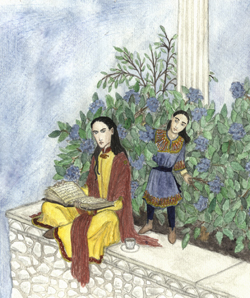
"Not Now! I'm Busy" by Oloriel.
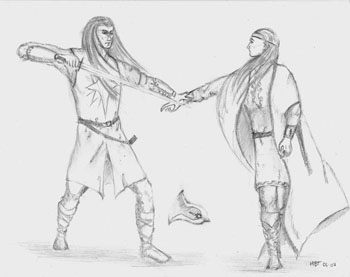
"See halfbrother! This is sharper than thy tongue" by Marie Bebe.
After settling in the mountains to the north of Tirion, Fëanor built a stronghold for the Silmarils and the other jewels and weapons he carried with him into exile. Meanwhile Melkor’s role in the strife among the Noldor had been revealed at the time of the judgment of Fëanor. Melkor fled Tirion and went into hiding. The first years of Feanor’s exile passed without event except for the ominous signs of growing darkness. Melkor approached Fëanor in Formenos in an attempt to intersect his growing mistrust of the Valar and protectiveness of the Silmarils. Fëanor, who among all of the Noldor hated Melkor most, cursed at him and sent him away. But Finwë alarmed sent a messenger to Manwë warning him of Melkor’s activities. Threatened and pursued by Tulkas and Oromë, Melkor withdrew from Valinor entirely for a time and the shadows receded.
Choosing the time of festival as an opportunity to attempt to restore peace among the Noldor, Manwë commanded Fëanor to appear. Fëanor came, but did not dress in festive finery for the celebration, nor did he bring the Silmarils with him. King Finwë, who had vowed he would not return as long as Fëanor was restricted by the rule of banishment, along with Fëanor’s sons and his other followers, remained behind in Formenos. High princes of the Noldor and eldest sons of Finwë, Fëanor and Fingolfin came together before the Valar and all of their people. Fingolfin promised to accept his brother’s precedence, uttering the much-quoted lines: “Half-brother in blood, full brother in heart will I be. Thou shalt lead and I will follow.” And Fëanor responded “I hear thee. So be it" (5). Yet even as they stood before Manwë and the majority of the Noldor, Melkor in a conspiracy with the ancient monster-in-giant-spider-form Ungoliant crept up unnoticed to the Green Mound of Ezellohar and destroyed the Two Trees.
The significance of the destruction of the Two Trees which lit the whole of the so-called Blessed Lands with their incomparable golden and silver light is emphasized by Tolkien in his paragraph describing their destruction by Melkor:
. . .with his black spear he smote each Tree to its core, wounded them deep, and their sap poured forth as it were their blood, and was spilled upon the ground. But Ungoliant sucked it up, and going then from Tree to Tree she set her black beak to their wounds, till they were drained; and the poison of Death that was in her went into their tissues and withered them, root, branch and leaf; and they died (5).
It had been his first. Nienna explained to him the meaning of Death a while ago when he sought council in bitterness. But this was different. Looking down on the lifeless body of his father, Fëanor fought down his anger and pain that tore him apart. The Valar had held him captive in their councils, displaying their greed, lusting for the jewels themselves. Talk, but no deeds. Kneeling down, he gathered the broken body in his arms. The fire flared up inside him and soon, soon it consumed his spirit. Repeating the words once more, he cried hoarsely: “Curse him!”
~~~
"First Blood Spilled" by Rhapsody the Bard
After destroying the Trees, Melkor and Ungoliant fled to Formenos to steal the Silmarils. With the Darkening of Valinor, the Valar realized that now Fëanor’s precious Silmarils, which they had always regarded as scared and incomparable among all the designs or inventions of either the Valar or the Eldar except perhaps for the Trees themselves, contained the only remaining fragment of the light of the Trees.
Not even Fëanor himself could replicate them for a part of his life force was spent in their creation. Nonetheless, the Valar begged Fëanor to give the Silmarils to Yavanna so she could use them attempt to restore the Trees. But Fëanor refused to relinquish them. Only Aulë appeared to understand the breaking of the Silmarils would result in the destruction of Fëanor.
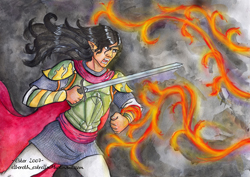
"The Fury of Fëanor" by Ester Salguero Amaya.
In the midst of dissension, darkness, fear and overwhelming uncertainty, the news came that Melkor had killed King Finwë at Formenos, broken into Fëanor’s stronghold and fled with the Silmarils. It quickly became evident that Melkor had slipped out of the reach of the Valar and fled Valinor entirely. He returned to Angband, his fortress in the north of Middle-earth, carrying the Silmarils with him, which he would wear in his crown.
Fëanor’s fury at the Valar for their incapacity to cope with the evil wrought by one their own was surpassed only by his hatred for Melkor. He renamed him Morgoth, the “Dark Enemy of the World.” The majority of the Noldor, faced with the loss of their King and the theft of the greatest treasure of their people, had also lost all confidence in the Valar who had brought them to this supposedly safe and deathless land and had then shown themselves completely unable to protect them.
Except for Nelyo: he--my eldest son and heir--fought against me, at first using the slick arguments as he’d been taught by years in my father’s court, eventually devolving into hysteria, shouting at me and slipping on the sloped beach, cutting his hands upon the sharp rocks. The others looked away from the spectacle of their favorite lord and certainly the most dignified screaming at his father with tears in his voice. My other sons were eager to comply, and as we dipped arrows in oil and aimed at the sails that would easily catch flame, Nelyo strode away down the beach, wiping his cheeks with his bloodied hands.
In the roar of the flames, the whisper of treachery grew louder, and the ponderous bellies of the clouds overhead grew crimson with our betrayal. But it wasn’t betrayal. It was what we had to do to survive, and I do not think that you’ll find a single account written that night that says otherwise.
Except, perhaps, my son’s.
~~~
Excerpt from The Tapestries by Dawn Felagund
After it became know that Morgoth had fled the Valar and the Maiar, with the Vanyar at their side, stayed and wept for what had passed. The Noldor, however, although they mourned as well, returned to Tirion and considered what they should do next. Overwhelmed with sorrow at the murder of his father and tormented by the rape of the Silmarils by his arch enemy, Fëanor asserted his right to the kingship of all the Noldor. Despite scorning the Valar, Fëanor, in his rage and eloquence, convinced the overwhelming majority of the Noldor to take their fate into their own hands and abandon Valinor to return to Middle-earth. Only Fëanor’s sons joined him in his infamous oath to fight to the death anyone who attempted to prevent them from regaining possession of the Silmarils.
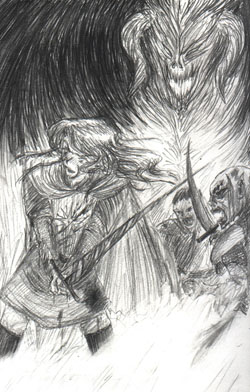
"Long He Fought On" by Caitlin.
The air is heavy and the stars are faint, even the voices of my sons are distant.
I stare at the stars, those which my father was born beneath, those that he loved and honoured, the stars that emboldened him on the Long Journey. I want to close my eyes, to shudder, to know that I failed him in life, but my eyes remains open.
I should have let him love and to be happy, should have given him as much as he gave me. Instead I forced him to choose, son against son.
Insanity took me at his murder and now I die with bloodied hands and soul. Father, do you still love me?
Someone trickle water on my face, a soft voice whispering words I cannot hear. Nerdanel, is that you? No… No… I forgot… Nerdanel is not here. Nerdanel the wise stood strong where I faltered. One of our sons then, Macalaurë… the one with her voice.
I have cursed them, damned them and bound them to suffer. My own sons. I struggle to breath, to release them from the oath I forced upon them but instead I choke. I am dying. Please, my sons…. Forgive me…
~~~
From the collection Voices of Despair by Ford of Bruinen
Fëanor, his sons and their closest allies hurried first to Alqualondë, with Fingolfin’s host led by Fingon following more slowly behind them, and the rear of the Noldor being taken up by Finarfin and Finrod. When Fëanor reached Alqualondë he argued with the Teleri and their king that they should join with the Noldor in their flight and when he was refused asked for their ships in name of past friendship and favors rendered. Again the Teleri refused to aid the Noldor and compared their great white ships to Fëanor’s creations. Unwilling to accept any delay, Fëanor gathered his host together and boarded the Telerin ships with the intent of taking them by force if necessary. The Telerin mariners defended their ships and began to throw the Noldor into the sea at which time Fëanor and his company drew their weapons. The first kinslaying among the Eldar ensued resulting in the slaughter of the majority of the Telerin mariners.
The dim sound of hammerfalls, a familiar lullaby from childhood, had accompanied her when she closed her eyes – only to open them again (or did she?) in a place familiar yet strange.
Mountains… Taniquetil to the South behind her, a valley and a ridge to her right. It was night, or what night there was in the Blessed Realm with the stars bright overhead. At the edge of her mind was the memory of footsteps behind her, and the call of a young voice, little older than her own, but when she looked around, searching… naught but her memories.
They had begun here.
She turned back to the path – to find herself face to face with Fire.
Dazzled by the sudden brightness (he illuminated so much more than he should) she meant to step back, but found herself drawn, gently and irresistibly, towards the white figure in the flame. Familiar… so familiar a warmth that she had thought lost… enveloping her, flaring up, fading…
Upon waking she would swear that she had felt a touch to her lips like a kiss of farewell.
It was no surprise to her when a messenger arrived, black-clad, hailing from the Halls of Mandos.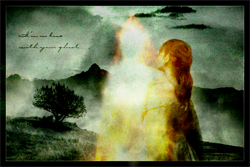
"Ghost" by Elleth. (Credit and full view.)
Fëanor’s flight began the long, heroic and heartbreaking First Age of Middle-earth. In retribution against those who had protested against Fëanor’s assumption of the kingship and argued in favor of Fingolfin, he had burned the remains of the white ships of the Teleri as soon as his smaller vanguard crossed into Middle-earth at Losgar. Morgoth’s host saw the lights of the burning ships and prepared a surprise attack upon Fëanor’s camp at Mithrim. This was the Second Battle in the Wars of Beleriand, the first having been fought by Thingol and his people before the arrival of that first wave of the Noldor.
Dagor-nuin-Giliath it is named, the Battle-under-Stars, for the Moon had not yet risen; and it is renowned in song. The Noldor, outnumbered and taken at unawares, were yet swiftly victorious; for the light of Aman was not yet dimmed in their eyes, and they were strong and swift, and deadly in anger, and their swords were long and terrible” (6).
The teacher gazed at the intent faces of the young men and women before him.
"The loremasters claim there is only one possible interpretation of the myth of Fëanor. I disagree. Both his glory and his disgrace come from the will to master fate and find freedom from the tyranny of the elements. He strove for knowledge and skill for all. No longer would power be only the province of the gods. For this ungodly pride he lost his life.
"Those who seek to better the lot of our fellow men honor him as the greatest of friends. Praise him!"
~~~
"Another Prometheus" by Gandalfs apprentice
Yet, despite their decisive victory, Fëanor was not to survive his first battle against Morgoth in Middle-earth. His pride and rage compelled him to pursue Morgoth to near the gates of Angband itself, where he was slain by Gothmog, Lord of the Balrogs.

"Young Fëanor" by Breogán.
Although the prophecy of Mandos was fulfilled--tears unnumbered were indeed shed by the Elves and Men of Middle-earth--Fëanor’s words were prophetic as well.
“We are threatened with many evils, and treason not least; but one thing is not said: that we shall suffer from cowardice, from cravens or the fear of cravens. Therefore I say that we will go on, and this doom I add: the deeds that we shall do shall be the matter of song until the last days of Arda” (6).
The valor and heroism of the rebellious Noldor is unquestionable. Both the sons of Fëanor and his half-brothers built and ruled vast kingdoms in Middle-earth and prevented Morgoth from triumphing for the whole of the First Age until the Valar finally relented and came to join the forces of resistance in the final destruction of Morgoth.
Footnotes
1: The Silmarillion, “Of Fëanor and the Unchaining of Melkor”
2: The History of Middle-earth, Volume 12, The Shibboleth of Fëanor
3: Unfinished Tales, “Part One: The First Age, Of Tuor and his Coming to Gondolin,” Footnote 2
4: The Silmarillion, “Of the Silmarils and the Unrest of the Noldor”
5: The Silmarillion, “Of the Darkening of Valinor”
6: The Silmarillion, “Of the Flight of the Noldor”
Fëanor's biography was written by Oshun.